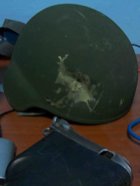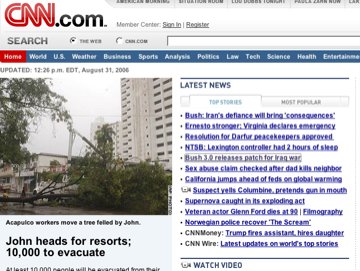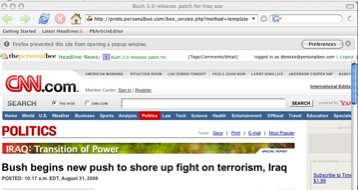 Last Monday, I posted something I’d found in my daily Iraq reading about a U.S. Army captain, John McFarlin, who had been shot in the head during a firefight with insurgents but emerged unscathed thanks to his combat helmet. I was struck by what I read as the detached, nearly clinical language McFarlin used to describe the event. The Army News Service quoted him saying, “I was suppressed for a moment and then I got back up” and returned fire. I wondered aloud, with a touch of sarcasm, whether “suppressed” was a euphemism for “stunned.” Then it was on to other business. But a couple days ago, I saw a new comment on the post:
Last Monday, I posted something I’d found in my daily Iraq reading about a U.S. Army captain, John McFarlin, who had been shot in the head during a firefight with insurgents but emerged unscathed thanks to his combat helmet. I was struck by what I read as the detached, nearly clinical language McFarlin used to describe the event. The Army News Service quoted him saying, “I was suppressed for a moment and then I got back up” and returned fire. I wondered aloud, with a touch of sarcasm, whether “suppressed” was a euphemism for “stunned.” Then it was on to other business. But a couple days ago, I saw a new comment on the post:
“Stunned would be if I were disoriented and didn’t know what happened.
“Suppressed is when you get down because it seemed like the guy who was shooting at you was on target and it was a good idea to drop down for a moment. It’s a technical term and I chose it because it means “the target chooses to conceal itself instead of presenting.”
“When the gunners on the other two HMMWVs [high-mobility multipurpose wheeled vehicles] engaged him, then HE was suppressed.”
The comment was signed “John McFarlin” — the name of the man who had been shot. I was surprised, not stunned, and wrote him back, thanking him for the clarification and “for the dedication it takes to serve in such a challenging environment.”
I wasn’t entirely surprised when a few hours later, an email with a photograph attached arrived.
“Dear Dan,
“No problem!
“I really don’t want to make much of it, but really it felt like an open hand slap on the head. The equipment that we have these days is pretty good–I mean this not only in relative terms, but in absolute terms, as well. Not only was my life preserved, I was able to return to the fight at hand, though I prudently remained down until my fellows engaged the AIF [anti-Iraqi forces] individual who shot me. The photograph attached shows the exit hole of a round that passed through the buttstock of the crew served weapon I was manning. Had I been up, and that butt stock been where it normally is–out against my shoulder–the round would have struck me–although in the armored plate. So, even then, I would have been protected. Anti-climactic, I know.
“By way of letting you know that I am in fact the Soldier mentioned, I send you a photograph of the helmet. I retain the helmet to this day, and will always display it as proof of our nation’s dedication to caring for our Soldiers. This is the bottom line: I was shot in the head, and not so much as a pause in duty, let alone a Purple Heart. That’s the good news to take away from this.
“You’re very welcome, by the way. Go have a beer, lay down in the grass, or do something else pleasant that you like to do, would you? That’s part of the point of what we do as Soldiers.
“Best!
John McFarlin
CPT, AR, USA”
(By the way, all of Captain McFarlin’s remarks in this post are quoted in their entirety; I’ve spelled out some of the acronyms he uses in brackets.)
That last little paragraph rankled me. To me, it’s saying, buddy, don’t you worry about what’s happening over here. Just turn over and go back to sleep. And I told McFarlin so:
“… There’s something implied there that I object to — the notion that you and the millions like you who serve and have served in the armed forces are enduring disruptions in their own lives and putting themselves in harm’s way so that the rest of us can sit on our barstools as if we have nothing to worry about. Don’t get me wrong — I like to have a beer as much as the next guy, and I’m buying if we ever find ourselves in the same neck of the woods — but frankly I don’t want anyone risking life and limb just so I can drink my microbrew unperturbed. If you spent any time perusing my now very occasional comments on the war in Iraq, you know I’m no fan of the enterprise and never have been. In short, I’ve always felt we went into the conflict with only the most casual assessment of what the true long-term costs and effects would be; the people who have paid the immediate price for that carelessness are people like you who undertake their service in good faith and the tens of thousands of Iraqis who, with no say in the matter, have died as we remake their society for them. Ultimately I don’t expect you to agree with any of the above — in fact, I expect you to tell me how short-sighted and misguided a view it is. (But the right to freely express such disagreements — that’s worth serving for). I also think that the least we owe you as citizens is to think seriously, every day, about the war and about how to resolve the conflict before it becomes something we bequeath to the next generation, or the one after that, to take care of.”
At this point, it won’t be a shock to hear that McFarlin wrote back:
“Dan,
“Absolutely you can use anything we write to one another as you wish. Be charitable to my person, even if we may have different points of view–that’s all I ask. I know you’re not a fan of the effort in Iraq (it really doesn’t rate the word “war”), not why it was engaged, nor the sausage-making that’s going on over here as it’s presented in the news. I can appreciate that.
“It takes an effort on my part to even think of how the inconvenience and risk which I take as being part of this effort in Iraq is something I should consider being upset about. I mean, I am a member of what amounts to a modern warrior-monk society. Think about it: no sex, no beer, plenty of privations, and the opportunity for bodily mortification. Many of the discussions about the deeper politics surrounding why we are here never really enter into our minds. Or if they do, they enter them quietly, sit down, read a newspaper and have a smoke, and then tiptoe out the way they came. We’re differently minded people, I guess. Maybe this is some sort of congenital blue-statism. Or maybe there’e something more to it than is easily or glibly explained.
“This thing that happened to me, getting shot. It’s great, a great success story about how a nation graced with smart people, liberty, and money has been able to defeat the weaponry of our would-be killers–a bunch of primitive screwheads without a moral leg to stand on, straight criminals, really. Not with bullets–though we have plenty of those–but with synthetics and ceramics worn by a Soldier on a hot April day in Diyala Province, Iraq. This is both remarkable and anti-climactic. Some person with a twenty-pound brain worked out the material science that permitted me to live. It had nothing to do with heroics or MY effort at all–although some Soldier before me secured the blessings of liberty so that the person with the twenty pound brain could concentrate on material science instead of how to navigate the maze of corruption and race hatred so prevalent in so many parts of the world. I want people to know that I got shot. And lived. And more than that, I wasn’t even hurt. I was right back in the fight, and I think it’s important for people to know that we live in an amazing country, and that the most misguided of adventures (for those who characterize the extraordinary effort in Iraq as such) can result in sublime moments. Moments that throw into sharp relief the difference between who we are as a people, and the peoples of the rest of the world. Even if I died for something as obscure as the right or the opportunity for a skinny, thick-glasses wearing kid to excel in material science, it would be enough. Because that’s worthy.
“But, regarding the notion that the millions who serve don’t do so to allow their countrymen to live in peace and prosperity: If I were to say to you that it is a common saying here–in reference to some idiotic celebrity news headline, or the latest imbroglio over which American Idol contestant is going to continue, or the no holds barred fight over a leather covered ball striking a player in a game where the wages are ridiculously inflated–that we fight so that people in America can live so well, that these are their concerns, rather than the horrid, inhuman concerns that people in Iraq must bear…would you believe it? We look at our countrymen living well in America, and we smile crookedly at our own privations, knowing that the terrorists are losing. BIG TIME. Every beer that is drunk. Every woman who wears a mini-skirt to a bar and goes home with a guy she picks up. Every porno mag that gets bought. Every Jew that says “Shalom” to a Muslim. Every inane television program. These are victories–we live vicariously through our countrymen–and so it’s no stretch at all to say that we enter the heart of our discontent and find solace in the fact that our sacrifices have some meaning in a greater context which, though it can be hard to comprehend day to day, makes some sense in a long view. We say, over our meals while shaking our heads over some idiotic sensationalism, “We fight, so that people can worry about that stupid crap,” and we mean it. Unbelievable, but true. I know you don’t want guys like me putting our lives on the line so you can knock back a nice cold one in comfort while watching Battlestar Galactica, but most of us in uniform are convinced that we already won the lottery, even by being born in the United States, and the least we can do is shoulder a share of the burden.
“I hope that I have presented this strange point of view that drives many Soldiers without being overly pedantic, but there’s something profound in the selflessness of many Soldiers. We talk a good game about how we’re in it for us, and about how we’re going to go buy a Harley when we get back, or blow it all on strippers, or some other misuse of our wages (I personally am getting my credit card debt paid down a bit) but in truth, we’re the workhorses of empire–an empire that every American, whatever his political stripe, shares in, just by virtue of the freedoms and luxuries which they take for granted–or even not for granted–every day. And this empire always existed, and was always secured by force: sometimes bald-faced, sometimes sublimated in some way that was not so offensive to the sensitive.
“I hope that this rambling is comprehensible, and that you understand that not once have I taken any easy path in expressing what must necessarily be a complicated web of thought. As for any differences in opinion we may have: We believe what we believe because it seems right to believe the way we believe, and not because of any fundamental difference in the quality of who we are. So much public discourse is shameful, with accusations and attempts to annhilate those of different perspective–a great waste of energy. I hope that in this case, I have expressed how what I believe provides a context for the decision to volunteer for deployment to Iraq, rather than the very much less worthwhile discussion methodology of trying to convince someone that what they believe isn’t correct.
Best,
John”
I haven’t written back, yet, beyond a small note of acknowledgment. Somehow, in the spirit of the exchange, I feel I need to let him have the last word till I write a more thoughtful response to him. Stay tuned.
Technorati Tags: iraq
Like this:
Like Loading...



